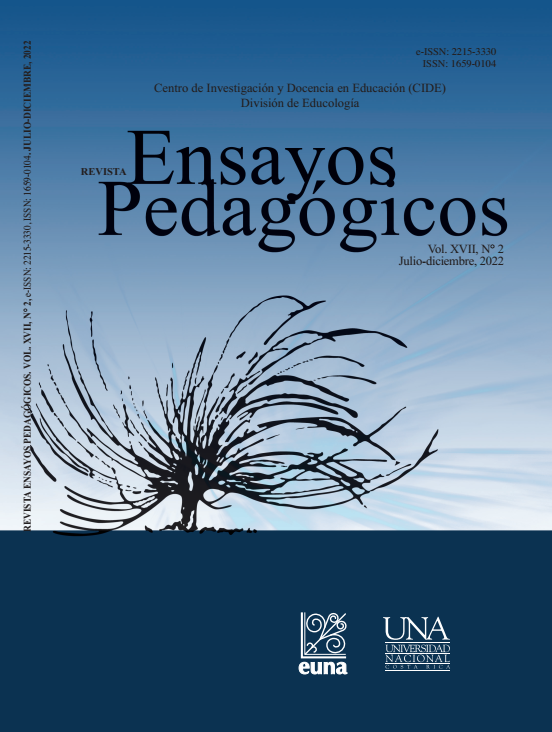A Curricular Proposal from Educators to Educators in Times of a Pandemic: A Master’s Degree Proposal in Education with Emphasis on Learning Processes in Virtual Environments
DOI:
https://doi.org/10.15359/rep.17-2.13Keywords:
curricular design, higher education, pedagogical mediation, virtual environmentsAbstract
The various educational scenarios pose changes related not only to the roles of the actors that participate in them, but also to the teaching and learning processes. The arrival of the COVID-19 pandemic required the incorporation of technological tools for the development of the educational process in virtual environments. This is how the question that guides this research arises: how to meet the needs of teacher training from any school level in terms of virtual pedagogical mediation so that teachers develop the necessary technological skills to face the challenges of education in the 21st century? The research focused on diagnosing the teacher training needs of 53 national and international in-service teachers who were working during the COVID-19 pandemic in 2021. The study was based on the mixed-method approach by using both qualitative and quantitative techniques and instruments which were applied to teachers in service from both inside and outside the country, employers, and administrators of the Master’s Degree of Education of the Department of Educology from Universidad Nacional, Costa Rica. The result revealed that the vast majority of educators possess technological knowledge and competence when using technological tools; however, they lack skills for the development of pedagogical mediation through virtual environments. For that reason, the curricular proposal for the design of a Master's Degree in Education with an Emphasis on Learning Processes in Virtual Environments was created as a product of a research process to obtain the Doctorate Degree in Curricular Development from the Michoacán Interdisciplinary Pedagogical University (UNIPEM) in Morelia, México. This curricular proposal intends to train teachers from any educational level not only at a national but also at an international scope.
Keywords: curricular design, higher education, pedagogical mediation, virtual environments.
References
Creswell, J. y Plano, V. (2007). Designing and conducting mixed methods research [Diseño y desarrollo de investigación con métodos mixtos]. Sage Publications.
Díaz, K. (2021). MEP ofreció cursos en línea para la actualización y formación docente, durante el 2020. Ministerio de Educación Pública, Gobierno de Costa Rica. https://www.mep.go.cr/noticias/mep-ofrecio-cursos-linea-actualizacion-formacion-docente-durante-2020
Fuster, D. E. (2019). Investigación cualitativa: Método fenomenológico hermenéutico. Propósitos y Representaciones, 7(1), 201-229. http://www.scielo.org.pe/pdf/pyr/v7n1/a10v7n1.pdf
Hernández, R., Fernández, C. y Baptista, M. (2014). Metodología de la investigación (6a ed.). McGraw-Hill/Interamericana Editores. https://www.uca.ac.cr/wp-content/uploads/2017/10/Investigacion.pdf
Jiménez, V. y Comet, C. (2016). Los estudios de casos como enfoque metodológico. ACADEMO: Revista de Investigación en Ciencias Sociales y Humanidades, 3(2), 1-11. https://dialnet.unirioja.es/descarga/articulo/5757749.pdf
Ramírez, R., Quesada, J. y Vargas, C. (2021). Diagnóstico de los efectos en las condiciones sociolaborales de la profesión, el desempeño y las brechas en competencias docentes por medio de la percepción de las personas colegiadas profesionales en educación, tras las medidas ejecutadas por el Ministerio de Educación Pública para la continuidad de los servicios educativos en el contexto de la pandemia COVID-19. COLYPRO. https://www.colypro.com/wp-content/uploads/2021/12/Informe-Diagnostico-Condiciones-y-ejercicio-Docente-Covid-Colypro-2020.pdf
Okuda, M. y Gómez-Restrepo, C. (2005). Métodos en investigación cualitativa: triangulación. Revista Colombiana de Psiquiatría, 34(1), 118-124. http://www.scielo.org.co/pdf/rcp/v34n1/v34n1a08.pdf
UNESCO. (2019). Declaración mundial sobre la educación superior en el siglo XXI: visión y acción. Revista Educación Superior y Sociedad (ESS), 9(2), 97-113. https://www.iesalc.unesco.org/ess/index.php/ess3/article/view/171
UNESCO. (2020). COVID-19: La acción que lleva a cabo la Coalición Mundial para la Educación de la UNESCO ante el mayor trastorno del aprendizaje nunca experimentado. https://es.unesco.org/news/covid-19-accion-que-lleva-cabo-coalicion-mundial-educacion-unesco-mayor-trastorno-del
Valenzuela, J. (2000). Los tres "autos" del aprendizaje: aprendizaje estratégico en educación a distancia. Revista de la Escuela de Graduados en Educación, 2, 1, 3-11. https://repositorio.tec.mx/bitstream/handle/11285/578193/Los%20tres%20autos%20del%20aprendizaje.%20Aprendizaje%20estrategico%20en%20educacion%20a%20distancia.pdf
Published
How to Cite
Issue
Section
License
Ensayos Pedagógicos is subscribed to the Attribution-NonCommertial-NoDerivatives 4.0 International Creative Commons Licence, which allows both authors and readers to freely download, store, copy, and distribute the final approved publisehd version of the manuscript (post-print) as long as this is done without commercial purposes, no derivative works are generated, and the source and author are mentioned. As well, Ensayos Pedagógicos declares that authors will remain the rightful owners of the copyrights of their work in perpetuity.







